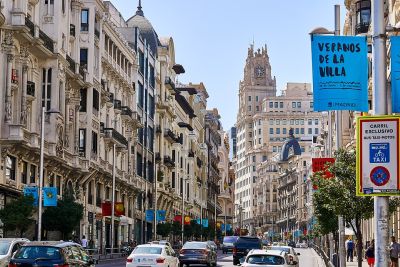When was the last time you remember sipping your coffee in a café accompanied by music that didn’t bother your ears? As if the chase between the scorpion and the hour hand wasn’t enough, coffee consumed without enjoying its taste adds to it, in my opinion. Yet, isn’t there a forty-year bond for a cup of coffee?
Just as our lives are constantly changing, the rhythm and lyrics of music also undergo transformation. Each generation forms its own understanding of music. There is interaction based on the period and conditions. Especially with the end of the Middle Ages and the beginning of the Renaissance, the innovations and expansions have a significant impact on music. Music, which has been interrupted since the end of the approximately 1000-year Church domination and the Ancient Age period, begins to develop again. One of these developments is instrumental music. Existing musical instruments are improved, and new musical instruments gradually emerge. Musicians and composers closely follow instruments that are open to innovations, and brand new music forms and different compositions emerge. For example, the cello was previously used to accompany other musical instruments. During this period of development, it turns into a solo musical instrument, and over time, sonatas that leave their mark on history emerge from this instrument.
Classical or romantic periods and terms familiar from literary history also find their place in music history. The period between the second half of the 18th century, that is, from the death of Bach in 1750 to the death of Beethoven in 1827, is called the Classical Period. One of the prominent features of the Romantic Period, which is considered to begin at the beginning of the 19th century, is positioning music at the center of everything and emphasizing emotions predominantly. Romanticism is a movement that appeals to the bourgeoisie and opposes the classical period. Thus, music transitions from addressing nobles before the romantic period to addressing the public, entering concert halls filled with the middle-class population.[1]
Johannes Brahms, one of the most magnificent composers of the second half of the 19th century and German music romanticism, is born on May 7, 1833, in the city of Hamburg, Germany. His father, Johann Jakob Brahms, is a musician who plays the violin and double bass in city bands. Father Brahms learns the profession of musician like a craft, and his son starts his music life with his father. Johannes Brahms seems never to have questioned the idea of being anything other than a musician in his life.[2] This is his first and perhaps only assurance given to himself. Brahms, the middle child of a poor family, resides in one of the outskirts of Hamburg. He starts playing the piano at the age of six and goes to various places to play the piano. Brahms, who gradually becomes recognized by everyone, is mentioned in an article of a magazine with praise-filled words. He plays his works with such a different interpretation that the piano becomes an orchestra playing enthusiastically, and the sonatas played turn into a grand symphony.
Brahms’s fame spreads throughout Europe and even to America. He is awarded in many places. Brahms travels from city to city due to teaching activities and concerts. He comes to Vienna for his last visit. When he is elected as the director of an academy here, Vienna becomes his second home, and he settles here. During this time, Brahms learns about his mother’s death and composes a piece for her.
Brahms’s main areas of art are symphony and chamber music. After Beethoven, the peak of symphonies has been Brahms’s works. He wrote his first symphony at the age of 43.
The common point of well-known writers, poets, or composers so far is their desire to express their emotions and thoughts. Some have written expecting to be understood, while others have wanted to make their voices heard even if they were not understood. Brahms is one of them. Brahms, whose fame crosses continents, further emphasizes his feelings by using mottos in some works. The most famous of these is “FAF” – “Frei aber Froh,” which means “Free, but happy.” This also remains Brahms’s favorite adage.[3]
Despite earning a substantial income through concerts, awards, and the sale of his works, Brahms continues to live modestly. He spends his income by providing scholarships to the needy, contributing to projects, and supporting young musicians. He dies of liver cancer on April 3, 1897. He is buried in Vienna alongside Beethoven and Schubert.
Brahms composed tirelessly throughout his life. He made his voice heard from a neighborhood in Hamburg to the world. Sometimes we need something to express our feelings, especially in the most difficult times of our lives. Some of us sing a heartfelt melody, some of us write a poem. Sometimes we tend to divide our lives into black and white. However, when the sun is at its zenith, life begins to shine in different colors in our eyes.
“Darkness has never been permanent; sometimes there have been light declines, but even then, there has been no permanent interruption. If the sun has set somewhere, it has risen elsewhere; if it has set elsewhere, it has risen somewhere else and has always caressed our faces with its relative manifestations. For centuries, many dark periods have been illuminated by a surprising dawn.” This saying reminds us of the phrase attributed to Imam Suhrawardi, which is said to be a hadith but is actually attributed to him, “Press as much as you are pressed, the end of constriction means opening.”[4] There is also a term called “crescendo” in music literature. This means “increasing volume.” Playing with increasing volume means that the starting point is the lowest volume. The architects of innovations in society from the past to the present have also started their work with such a tone.
The Young Çağlayan started its life two years ago with a handful of people will become the “rising voice” of our society, especially our youth, as it develops day by day. Perhaps we are now at the moment when the crescendo begins!




